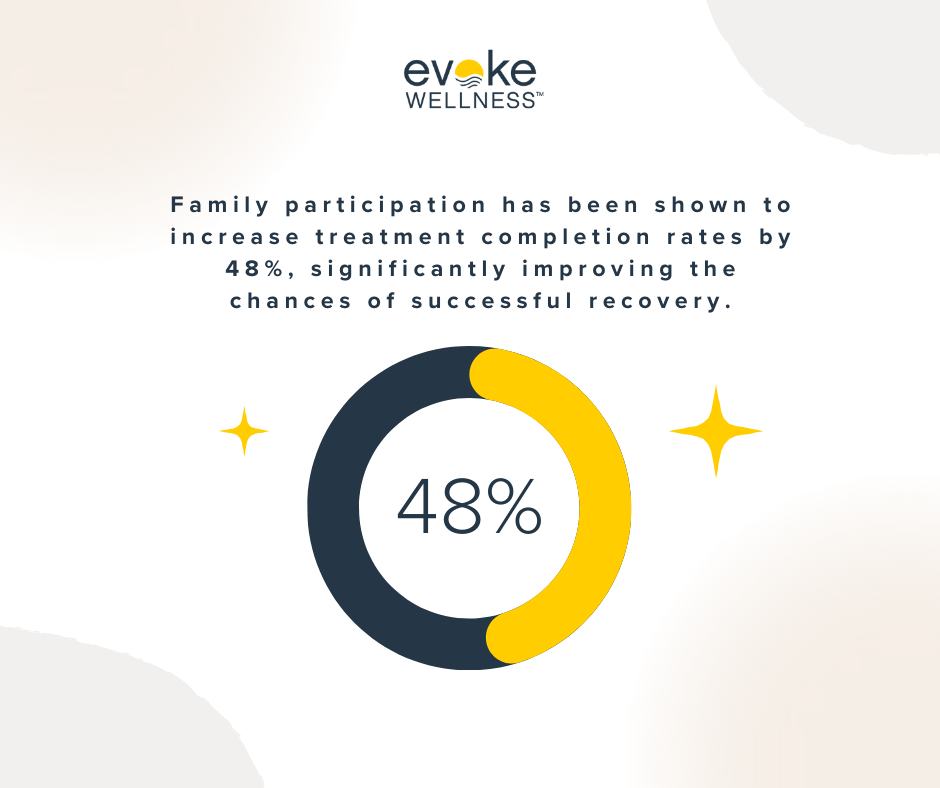As you embark on the challenging journey of addiction recovery, you may wonder how family therapy fits into the detox process. Recent studies show that involving family members in treatment can significantly improve outcomes. According to the National Institute on Drug Abuse, family therapy in addiction treatment can reduce relapse rates by up to 40%. This article explores the crucial role of family therapy during medical detox and residential treatment programs. You’ll discover how integrating family support into your therapy regimen can enhance your recovery experience and provide a stronger foundation for long-term sobriety. Understanding the family dynamics surrounding addiction is essential for comprehensive, effective treatment.
Together, let’s embrace the journey to recovery and the promise of a new beginning. Call us at (833) 819-6066 today or reach out online.
The Importance of Family Involvement in Substance Abuse Treatment
Family Support During Detox
Detoxification, the initial step in overcoming addiction, can be an emotionally and physically challenging process. Up to 80% of individuals experience mood disturbances like anxiety, depression, and irritability during withdrawal. Family support can provide invaluable emotional strength during this crucial phase.
Loved ones can offer encouragement, ensure a safe environment, and practice self-care to avoid enabling behaviors. Their presence reinforces the belief in recovery, which is vital when cravings and discomfort are at their peak.
Rebuilding Trust and Communication
Addiction often creates dysfunction, chaos, and trauma within families. Codependent cycles of enabling or controlling behaviors can reinforce the addiction, preventing healing. Family therapy programs help break these patterns by:
- Improving communication skills
- Setting healthy boundaries
- Rebuilding trust and connections
As families heal together, they develop a shared understanding of addiction as a brain disease, fostering empathy and compassion.
Comprehensive Addiction Treatment
After detox, individuals transition into residential or outpatient treatment programs. Many facilities recognize the importance of family involvement, incorporating family therapy and education into their programs.
This holistic approach allows loved ones to:
- Learn about the recovery process
- Identify relapse triggers
- Develop strategies to support long-term sobriety

Aftercare and Sober Support
The recovery journey continues after treatment through aftercare programs and sober support groups. Facilities like Evoke Wellness emphasize the importance of ongoing involvement in 12-step programs and counseling.
Family members can attend meetings, reinforcing a positive social support system. Their presence provides accountability, reducing the risk of relapse as individuals transition to independent, substance-free living.
How Family Therapy Helps with Addiction
Addressing Root Causes
- Family therapy gets to the heart of underlying family dynamics that may have contributed to addiction development. According to a study by the Substance Abuse and Mental Health Services Administration (SAMHSA), family involvement in addiction treatment increases the chances of achieving sobriety.
- Dysfunctional family patterns like poor communication, lack of boundaries, and codependency issues are explored and resolved through family therapy sessions.
Improving Communication & Bonds
- Substance abuse strains family relationships and erodes trust. Family therapy rebuilds those crucial support systems by teaching healthier communication skills.
- Family members learn how to openly discuss the addiction’s impact without judgment or blame. This fosters greater understanding, empathy and stronger bonds.
- Therapists guide families in setting boundaries, processing resentments, and reestablishing roles to create a more positive home environment for recovery.
Comprehensive Healing Process
- Addiction impacts the whole family system. Family therapy takes a holistic approach by involving loved ones in the healing process.
- According to a study published in the Journal of Marital and Family Therapy, participants who completed family therapy in addition to individual treatment had higher rates of abstinence at follow-up.
- By treating the family unit, therapy increases accountability and motivation while reducing relapse risks after completing inpatient or outpatient programs.
Through open discussions, improved communication patterns and resolving deep-rooted issues, family therapy plays a pivotal role in long-term addiction recovery. It empowers families to move forward as a united, supportive front.
The Role of the Family in Preventing Addiction
Fostering a Nurturing Environment
As the cornerstone of society, families play a pivotal role in preventing addiction by providing a supportive and nurturing environment for children and adolescents. Parents can help build strong family bonds, foster open communication, and set clear boundaries and expectations – all of which can significantly reduce the risk of substance abuse.
Early Intervention and Education
Involving the family in addiction treatment and recovery can improve outcomes, as family members can provide encouragement, accountability, and a sense of belonging. Family-based interventions, such as family therapy and education programs, can help families develop healthy coping strategies, improve communication, and address underlying issues that may contribute to addiction.
Advocacy and Access to Resources
Families can also advocate for policies and resources that support addiction prevention and treatment, ensuring that their loved ones have access to the necessary support and services. By being proactive and involved, families can play a crucial role in breaking the cycle of addiction and promoting long-term recovery.
Incorporating Family Therapy into the Detox Process
The Importance of Family Support
Detox is an essential first step in addiction recovery, but it can be an immensely challenging process both physically and emotionally. Having the support of loved ones can make a significant difference in the success of detox and ongoing sobriety. According to recent studies, family involvement increases motivation, encourages treatment adherence, and helps identify underlying issues contributing to the addiction.
Family Therapy Programs
Many residential treatment programs recognize the vital role families play and incorporate family therapy sessions. These allow loved ones to understand addiction, improve communication skills, set healthy boundaries, and develop strategies to support recovery as a united front. Dedicated family programs may also be available, offering therapy, support groups, and educational workshops.
Benefiting the Whole Family
Besides assisting the individual in detox, family therapy can help heal strained relationships and address dysfunctional patterns that enable the addiction. With improved understanding and open communication channels, families can work through resentments, mistrust, and codependency issues. This promotes an environment more conducive to lasting sobriety.
The Benefits of Family Involvement During Detox
Family support plays a pivotal role in successful detox and long-term recovery from addiction. According to recent studies, involving family members in the detox process can increase treatment engagement, improve outcomes, and reduce the risk of relapse.
Emotional Encouragement
Going through detox can be an emotionally and physically challenging experience. Family members can provide invaluable encouragement, motivation, and accountability during this critical phase. Their presence and support can help the individual stay committed to their recovery goals, even when facing intense cravings or withdrawal symptoms.
Practical Assistance
In addition to emotional support, loved ones can assist with practical matters that can significantly aid the detox process. This may include providing transportation to treatment facilities, managing household responsibilities, and creating a stable, sober living environment free from triggers or temptations.
Improved Communication and Trust
Family therapy programs offered by reputable addiction treatment centers like Evoke Wellness at Miramar can help families improve communication, rebuild trust, and address underlying issues that may have contributed to or been exacerbated by the addiction. Open and honest dialogue can foster a more supportive, recovery-oriented home environment.
Continuum of Care
Involving family members in the development of the treatment plan and ongoing care can ensure a smoother transition from detox to long-term rehabilitation. This continuum of care is crucial for sustaining recovery, as the individual navigates the challenges of early sobriety and adjusts to a new, healthier lifestyle.
By actively involving family members in the detox process, individuals can benefit from increased motivation, emotional support, practical assistance, and a stronger support system – all of which can contribute to successful detox and long-term recovery.
FAQ: What is the Role of Family Therapy During the Detox Process?
Supporting Recovery Through Family Involvement
Family therapy plays a vital role in the detox and recovery process. Involving loved ones increases treatment retention rates by up to 40%, underscoring the importance of a strong support system. Family programs foster shared healing, improved communication, and the rebuilding of trust within the family unit.
Equipping Families with Tools for Success
Through family therapy, loved ones gain a deeper understanding of addiction and its impacts. They learn effective coping strategies, problem-solving techniques, and ways to enhance communication. Families acquire tools to create a stable, trigger-free home environment, providing the serenity needed for successful detox.
Fostering Support and Accountability
Open dialogue in family sessions allows for celebrating milestones and offering compassionate encouragement. While emotional support is crucial, setting healthy boundaries avoids enabling behaviors, motivating personal accountability. With a committed support system, individuals have a higher chance of achieving lasting sobriety.
Addressing Systemic Issues Through Family Therapy
Addiction often stems from or is exacerbated by underlying family dynamics. Family therapy addresses these root causes, repairing strained relationships and rebuilding connections. By involving loved ones, the treatment approach becomes holistic, increasing the likelihood of long-term recovery success.
Comprehensive Care for Successful Detox
Family involvement during medical detox provides crucial support as individuals navigate withdrawal symptoms. Loved ones receive guidance on how to offer practical and emotional assistance, creating a strong foundation for the transition into ongoing treatment programs.
Conclusion
In conclusion, family therapy plays a crucial role in the detox process and overall addiction treatment. By involving loved ones, patients gain a stronger support system and improved chances of long-term recovery. As recent studies show, family participation can increase treatment retention rates by up to 40%. Whether undergoing medical detox, residential treatment, or outpatient therapy programs, integrating family support enhances outcomes.
By embracing family therapy as a key component of your addiction treatment journey, you’re investing in a more comprehensive and effective path to lasting sobriety and improved family dynamics.
Begin Your Journey with Evoke Wellness at Miramar
If you or a loved one is considering treatment, Evoke Wellness at Miramar invites you to contact us. Our compassionate team is ready to answer your questions, discuss your needs, and help you take the first steps toward recovery. In Miramar, you’ll find more than just a treatment program – you’ll discover a community dedicated to your wellness and success. Together, let’s embrace the journey to recovery and the promise of a new beginning. Call us at (833) 819-6066 today or reach out online.


